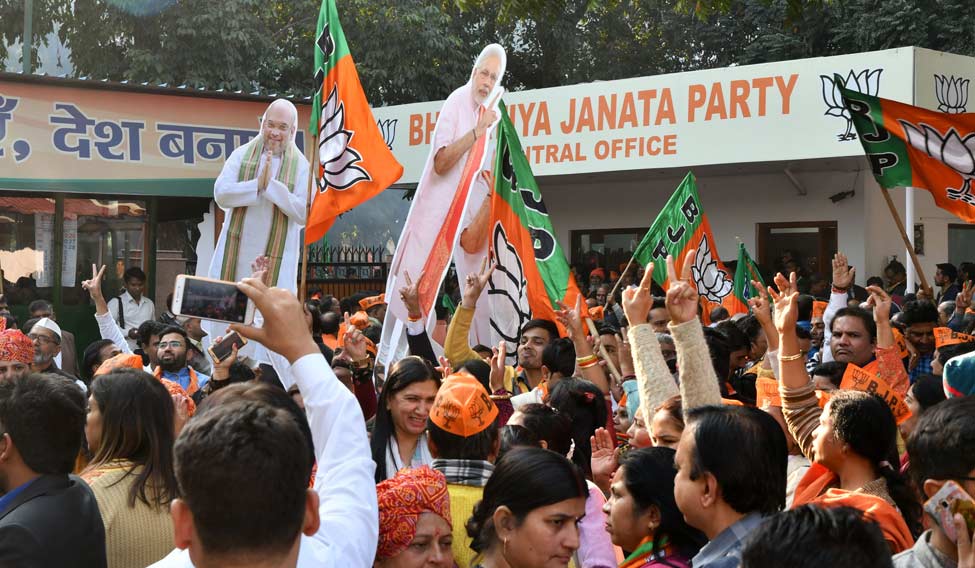The fourth year in office has been turbulent for prime ministers. But Narendra Modi heaves a sigh of relief as he has used his personality and effort to single-handedly retain Gujarat for the BJP for a record sixth term.
He has faced the challenge of a resurgent Congress head-on as he traversed his home state, much more than Chief Minister Vijay Rupani, to convert marginal constituencies into victories, and to encourage his troops.
Modi began 2017 with the big bang victory in Uttar Pradesh, which settled doubts raised by demonetisation, while the retention of Gujarat and wresting of Himachal Pradesh show that he is the sole strength of the BJP—without him, the party would have floundered. In Himachal Pradesh, the local leaders did not matter, with the BJP's chief ministerial candidate, Prem Kumar Dhumal, unable to win his own seat.
The successes of the sole vote winner mean there will be no challenge for Modi's leadership in the BJP, but he would also carry the Himalayan burden of straining himself to win every election for his party. In fact, even before the EVMs could be opened in Gujarat and Himachal Pradesh, Modi had gone to do pre-election campaigning in Meghalaya and Mizoram, which go to polls, along with Tripura, in February.
2018 will again test the campaigning skills of the prime minister as he continues to strive to achieve a Congress-free India, where his principal opponent does not have a single chief minister to call its own.
Apart from these three states, 2018 will see people go to polling booths in Karnataka (April) and Madhya Pradesh, Rajasthan, Chhattisgarh and Nagaland (towards year end). Among these elections, the fight is direct between the BJP and Congress in six states, with regional parties dominant in Tripura (CPI[M]) and Karnataka (Janata Dal [Secular] in the southern part of the state).
In Karnataka, Meghalaya and Mizoram, the Congress would be defending its turf, while the BJP is ruling Madhya Pradesh, Rajasthan and Chhattisgarh. The CPI(M) has been in power in Tripura for long, and the Naga People's Front government rules Nagaland, where the BJP is a minor partner.
The eight Assembly elections, to be held in three batches according to current indications, will be the semifinal contest between Modi and the new Congress president Rahul Gandhi. Modi and his party have laid so much negative emphasis on Gandhi that the young leader has become the face of the opposition to the BJP.
The non-BJP opposition had the same approach for Modi in the run-up to the 2014 Lok Sabha elections, giving Modi pre-eminent position among all BJP leaders. This could lead to regional parties in some states aligning with the Congress, even though local conditions preclude the CPI(M) (Kerala), Trinamool Congress(West Bengal), Biju Janata Dal (Odisha) and Aam Aadmi Party (Delhi) from shaking hands with the Congress, which is their main opposition at the state level. But these parties would be amenable for a post-electoral adjustment with the Congress, if the BJP falls short of a majority in the 2019 election.
Since the Gujarat victory has been a narrow one, Modi would have to think twice about advancing the Lok Sabha elections by one year or at least six months. If the BJP had touched the 150-seat target set by its high-achiever president Amit Shah, then Modi could have looked at elections in the summer of 2018, by advancing state Assembly elections, which are due in the second half of 2018. But Gujarat has shown the erosion of BJP votes after the landslide victory in 2014 elections when the BJP won all the 26 Lok Sabha seats to send its son of the soil as prime minister.
For Gandhi, time is at a premium as he has to campaign to retain the states run by the Congress and pose a challenge in those states controlled by the BJP and its allies. Simultaneously, he has to work on revamping the Congress party at all levels, and spend political time to work out new alliances against the BJP. There is no time for both Modi and Rahul to take it easy after the hectic and acrimonious campaigning in Gujarat.






